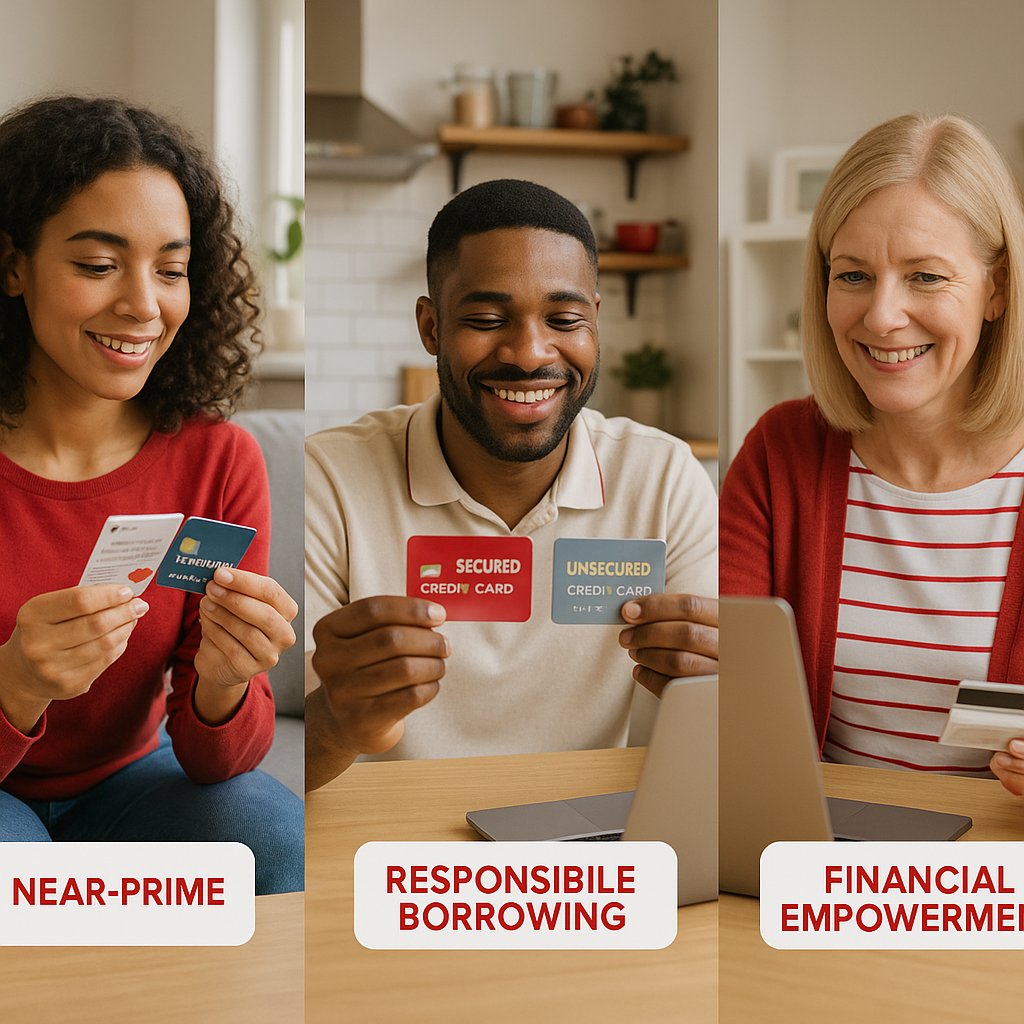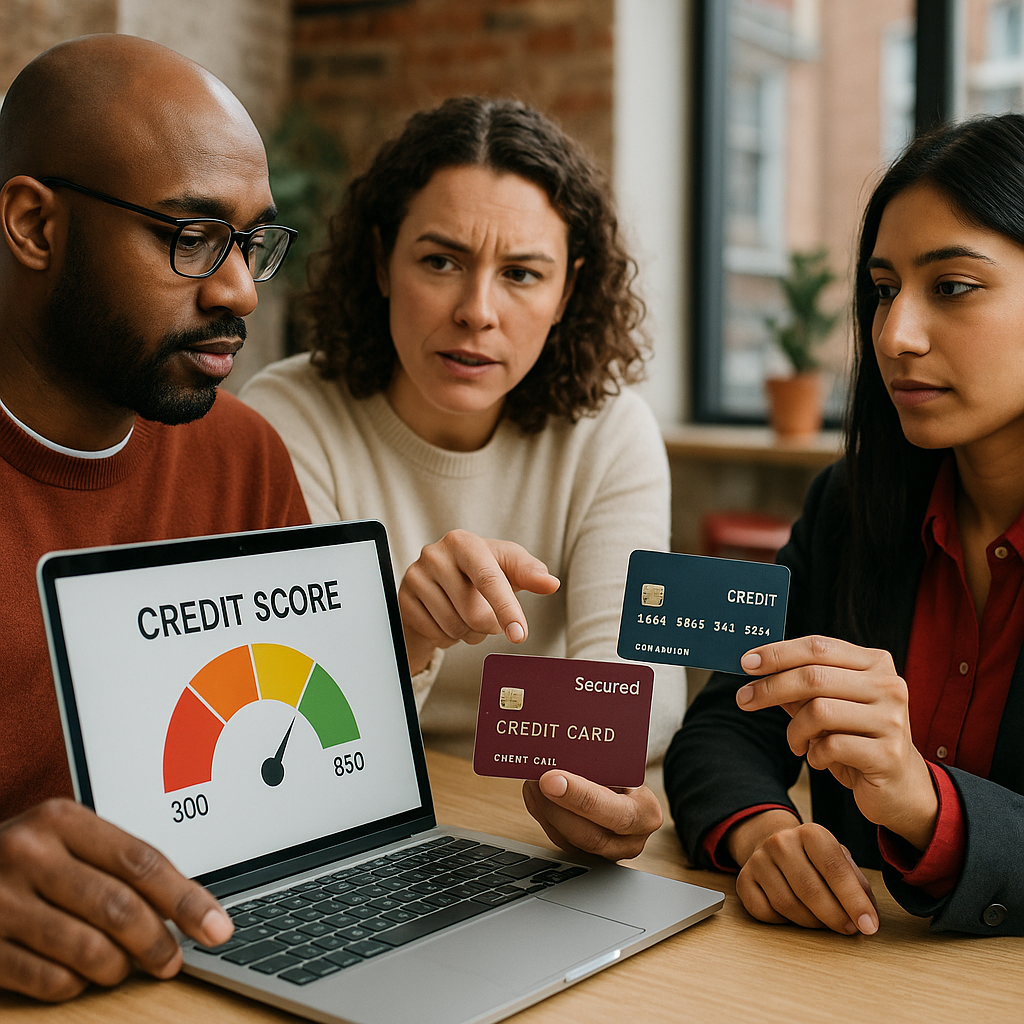Secured vs Unsecured Credit Cards for Bad Credit: A UK Near-Prime Guide to Building Credit, Choosing Wisely, and Upgrading to Better Limits
Learn how secured credit cards for bad credit in the UK can rebuild your score, compare secured vs unsecured cards, fees, and steps to upgrade.

Struggling with bad credit? You're not alone. In the UK, over 7 million people have credit files that can make borrowing challenging. But here's the good news: secured credit cards for bad credit can be your stepping stone to financial health. Unlike unsecured cards, secured cards require an upfront deposit, acting as a safety net for lenders while you rebuild your credit score.
Did you know that responsible use of a secured credit card—like making timely payments and keeping balances low—can help raise your credit score within months? This builds your financial confidence and opens doors to better credit options. While unsecured credit cards might offer perks like rewards and no deposit requirements, they often come with stricter eligibility and higher interest rates for bad credit customers.
Choosing the right card depends on your current credit situation and financial goals. At 118 118 Money, we're here to guide you through this journey, helping you make informed choices to improve your credit and take control of your finances.

Understanding Credit Building
Building or rebuilding your credit is a key step towards achieving financial fitness, especially if you have bad credit. Secured credit cards designed for bad credit are effective tools that allow you to demonstrate responsible credit usage. By making timely payments and keeping your balance low relative to your credit limit, you gradually improve your credit score, which lenders review when evaluating loan and credit applications.
A secured credit card requires a refundable security deposit, often equal to your credit limit, making it accessible even if your credit history is limited or damaged. The card issuer reports your payment activity to UK credit reference agencies like Experian and Equifax, so positive behaviour directly contributes to credit building.
It's important to remember that credit building is a marathon, not a sprint. Typically, it takes around six months of consistent, on-time payments before you start to see a positive impact on your credit report. Managing your secured credit card responsibly can open doors to unsecured credit cards with better perks and lower interest rates in the future.
For detailed guidance on credit building strategies, visit our credit building credit cards page to explore options tailored to your needs.
Secured vs Unsecured
When tackling bad credit, choosing between a secured or unsecured credit card is a key decision. Secured credit cards require you to put down a refundable deposit, usually matching your credit limit. This deposit acts as security for the lender, reducing their risk and making it easier for those with bad credit to qualify. Your deposit stays with the lender as collateral until you repay your balance or close the account. This makes secured credit cards a powerful tool for rebuilding credit, as your activity is reported to credit bureaus, helping demonstrate responsible use.
On the other hand, unsecured credit cards don't require a deposit but typically demand a better credit score to get approved. While unsecured cards may offer perks like rewards or higher credit limits, they might be challenging for those with bad credit to access.
For those starting out with poor credit, a secured credit card can be a stepping stone. With timely payments and prudent spending, you can build your credit score and possibly upgrade to an unsecured card over time. Remember, whichever option you choose, managing your credit wisely builds confidence and leads to better financial fitness.
Related video from YouTube
Credit Bureau Impact
Both secured and unsecured credit cards report your payment activity to the major credit bureaus in the UK, such as Experian, Equifax, and TransUnion. This reporting plays a crucial role in building or rebuilding your credit history. For those with bad credit, a secured credit card bad credit option can be especially valuable. By making timely payments and keeping balances low, you demonstrate financial responsibility, which credit bureaus use to improve your credit score over time.
It's important to understand that missed payments or high credit utilisation on either secured or unsecured cards can harm your credit rating. However, the security deposit on secured cards provides lenders with collateral, often making these cards easier to obtain if you have a poor credit history.
Using a secured card wisely acts as a positive signal to credit bureaus and can pave the way to qualifying for unsecured credit cards with better benefits. At 118 118 Money, we encourage responsible credit use to help you climb the credit ladder towards financial fitness.
Who Benefits Most
Secured credit cards are especially beneficial for individuals struggling with bad credit or those who lack a credit history altogether. By requiring a refundable security deposit, they provide a safer option for lenders, making approval more accessible even when credit scores are low or non-existent. This makes secured credit cards an effective stepping stone to rebuild credit and move towards greater financial confidence.
On the other hand, unsecured credit cards tend to suit those with a more established or improving credit score. They offer higher credit limits, lower interest rates, and often include rewards and perks that secured cards rarely provide. However, qualifying for unsecured cards can be challenging if your credit history is limited.
For those navigating the challenge of bad credit, a secured credit card for bad credit offers a valuable opportunity. Responsible use—such as making timely payments and managing credit utilisation—can gradually enhance your credit score, opening doors to unsecured cards with more benefits over time.
Ultimately, choosing between secured and unsecured credit cards depends on personal credit circumstances, financial goals, and readiness to take on credit responsibly. At 118 118 Money, we believe everyone deserves a chance to build a healthier financial future, starting with the right credit tool tailored to their needs.
Costs and Fees
When choosing between secured and unsecured credit cards, understanding the costs and fees is essential to making the right choice for your financial journey. Secured credit cards, often designed for those with bad credit or limited credit history, typically require a refundable security deposit that acts as your credit limit. These cards may come with higher interest rates compared to unsecured cards due to the increased risk for lenders. Additionally, some secured cards charge annual fees, which can range from £20 to £50, though options without annual fees are available.
Unsecured credit cards, which do not require a deposit, often offer lower interest rates and may include perks like rewards or cashback. However, they generally require a better credit score to qualify. Both types of cards can have fees for late payments, cash advances, or foreign transactions, so it's important to review the terms carefully. For more detailed insights on credit card charges, visit our Credit Card Charges page.
Take Control of Your Finances
Check Your Eligibility Now
Choosing Wisely
Choosing the right credit card when you have bad credit can feel overwhelming, but understanding the options helps you make empowered decisions. Secured credit cards require a refundable security deposit, typically ranging from 100 to 500, which sets your credit limit. This deposit acts as collateral, offering lenders reassurance and increasing your chances of approval even with a poor credit score.
On the other hand, unsecured credit cards do not require a deposit but often come with higher eligibility requirements, including minimum credit scores and income levels. While they may offer better rewards and lower interest rates, they can be more difficult to obtain if your credit history is less than perfect.
Evaluate your financial situation honestly. If you're building or rebuilding credit, a secured credit card could be a wise starting point. It helps establish positive payment history without risking further debt. For those with a steadier credit profile, an unsecured card may provide greater spending flexibility and benefits.
Remember, regardless of choice, responsible use is key. Pay your bills on time and keep balances low to steadily improve your credit score. For tailored options suitable for near-prime borrowers, explore our credit cards for bad credit to find the best fit for your journey to financial fitness.

Strategic Credit Building Plan
Building credit when you have bad credit may feel like a challenging mountain to climb, but with a clear plan and the right tools, you can reach the summit. One effective strategy is to start with a secured credit card, which is designed to help those with struggling credit histories regain financial footing.
Secured cards require a refundable deposit, often matching your credit limit, which minimises lender risk and makes approval easier even with a poor credit score. By making on-time monthly payments and keeping your credit utilisation low—ideally below 30%—you demonstrate responsible credit behaviour. This activity is reported to UK credit reference agencies, helping gradually improve your credit score.
Consistency is key. Over six months or more, regular payments can strengthen your credit profile, potentially unlocking the chance to upgrade to an unsecured credit card that offers more benefits. Remember, avoid overspending and make payments in full where possible to reduce interest costs and build positive credit history.
Combining this approach with the financial education and tools available at 118 118 Money's Money Guidance will support your journey toward financial fitness with confidence and clarity.
Upgrading to Higher Limits
Starting with a secured credit card is a smart way to rebuild or establish your credit, especially if you've faced difficulties in the past. One of the key benefits is the potential to upgrade to higher credit limits over time. Typically, secured cards have credit limits equal to the refundable deposit you put down. However, many providers understand that responsible credit management deserves recognition. By making on-time payments and keeping your balance low, you may become eligible to increase your credit limit without needing to increase your initial deposit.
This upgrade not only boosts your spending power but also positively impacts your credit utilisation ratio—a crucial factor in improving your credit score. After demonstrating consistent, responsible use, some issuers even allow you to graduate to an unsecured credit card, unlocking more benefits like rewards and lower interest rates.
At 118 118 Money, we encourage you to set achievable goals and monitor your progress. Remember, upgrading your credit limit is a step on your journey toward greater financial fitness and stability.
UK Path to Better Limits
Embarking on your credit journey in the UK with a secured credit card bad credit option can be a strong step towards financial empowerment. Secured cards function as a foundation, offering a credit limit often equal to your refundable deposit, which mitigates risk for lenders and provides you with responsible spending boundaries.
Over time, consistent on-time payments and low credit utilisation can enhance your credit score, potentially unlocking higher credit limits and access to unsecured credit cards. Financial experts suggest that after about six months of diligent use, a transition or upgrade may become possible, reflecting your improved creditworthiness.
- Start small: Use your secured card for manageable expenses you can repay monthly.
- Pay on time: Timely payments are vital to boosting your credit profile.
- Monitor progress: Regularly check your credit score to track improvements.
With platforms like 118 118 Money's credit building resources, you're supported every step of the way towards better credit limits and financial fitness.
FAQs and Next Steps
Can a secured credit card bad credit help improve my credit score? Yes, responsibly using a secured credit card can help rebuild or establish credit since payments and activity are reported to credit bureaus.
How does a secured card differ from unsecured cards for bad credit? Secured cards require a refundable deposit acting as your credit limit, making them more accessible for those with poor credit, whereas unsecured cards offer higher limits and rewards but usually need better credit scores.
What should I do next if I want to build credit? Start by checking your eligibility for secured credit cards designed for bad credit to find affordable options that suit your needs.
- Use pre-approval tools to explore cards without harming your credit.
- Maintain on-time payments and keep balances low to maximise credit building.
- Gradually aim to upgrade from secured to unsecured cards for better benefits.
Discover more about credit options tailored for you at 118 118 Money's credit cards for bad credit and begin your journey to financial fitness with confidence.